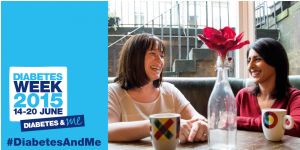Diabetes Week takes place from 14-20 June 2015 and aims to raise awareness of the signs and symptoms of the condition.
Around 3.2 million people in the UK have been diagnosed with diabetes and by 2025, it is estimated that this will increase to five million. Between 85 and 95 percent of people with diabetes have Type 2.
Pharma Nord's research has revealed a need for greater attention to be paid to diabetes risk. Despite the fact that one-third of UK adults are pre-diabetic and at risk of developing Type 2 diabetes (Diabetes UK), nine in ten of those surveyed are not worried about their blood sugar. Further, just one in three of us eat healthily to decrease the risk of becoming ill and less than one in ten know that there are supplements that can control blood sugar levels.
Did you know that if you crave sugary food and carbohydrates this could be a sign that you have high blood sugar? Here are some top tips to help you reduce your sugar intake and avoid dangerously high blood sugar.
1. Remember savoury can be sweet too. Many processed, convenience foods contain hidden sugars. Be wary of things such as soups and sauces. One way to control your sugar intake is to cook meals from scratch when possible.
2. Don't start the day with sugar. Muffins and pastries are laden with sugars. Start the day as you mean to go on by opting for porridge oats, natural yoghurt (topped with nuts or seeds) or wholegrain toast with some eggs.
3. Include chromium in your diet. High blood sugar can be caused by chromiu m deficiency. Chromium is found in small quantities in green leafy vegetables, potatoes and nuts and works together with insulin to move sugar out of the bloodstream and convert it to energy. Very little chromium is found in the modern diet so if you experience sugar cravings, you should try a nutritional supplement like Bio-Chromium.
m deficiency. Chromium is found in small quantities in green leafy vegetables, potatoes and nuts and works together with insulin to move sugar out of the bloodstream and convert it to energy. Very little chromium is found in the modern diet so if you experience sugar cravings, you should try a nutritional supplement like Bio-Chromium.
4. Stick to water. Nearly a quarter of the added sugar in our diet comes from soft drinks, fruit juice and other non-alcoholic drinks. For more information on the signs and symptoms of diabetes, click here.
For more information on how to control your blood sugar, visit www.bloodsugarcontrol.info

